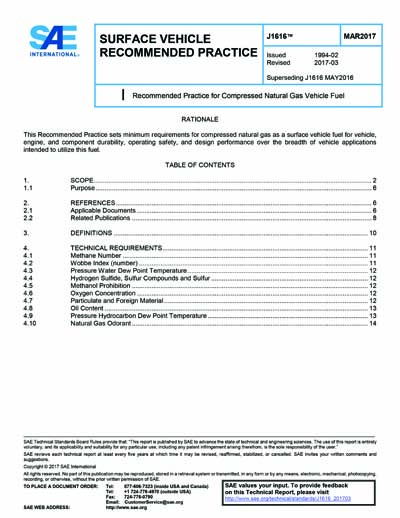Most recent
SAE J 1616-2017
Recommended Practice for Compressed Natural Gas Vehicle Fuel
Compressed Natural Gas (CNG) is a practical automotive fuel, with advantages and disadvantages when compared to gasoline. Large quantities of natural gas are available in North America. It has a higher octane number rating, produces low exhaust emissions, no evaporative emissions and can cost less on an equivalent energy basis than other fuels. Natural gas is normally compressed from 20 684 to 24 821 kPa (3000 to 3600 psig) to increase its energy density thereby reducing its on-board vehicle storage volume for a given range and payload. CNG can also be made from liquefied natural gas by elevating its pressure and vaporizing it to a gas. Once converted it is referred to LCNG. The properties of natural gas are influenced by: (1) source of supply i.e. field, composition or impurities; (2) the processing of natural gas by the production and transmission companies; (3) the regional gas supply, storage, and demand balancing done by distribution companies often in concert with pipeline companies to maintain uninterrupted service throughout the year, e.g., peak shaving with propane-air (see U.S. Bureau of Mines Publication 503); and (4) dispensing site maintenance characteristics i.e. filtration and drying. The Coordinating Research Council (CRC) has published the results of a national compressed natural gas vehicle fuel survey. Information on the properties of distribution system natural gas and its variability has been included in Figure 1, 2, and 3, and can be found in CRC Report No. PC-2-12. Composition can vary hourly under certain operating conditions in certain areas of the country. Thus the data should generally be considered representative for the areas mentioned with due consideration for local variation.
Content Provider
Society of Automotive Engineers [sae]






